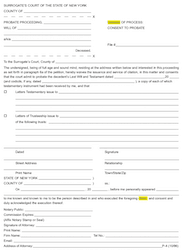I Received a Waiver and Consent to Probate. Should I Sign it?
You’ve received a Waiver and Consent to Probate in the mail, or an entire packet that contains a variation of
-
- a Waiver and Consent to Probate
- a cover letter
- a copy of a will
The cover letter is asking you to sign the Waiver and Consent to Probate and mail it back to the sender. The cover letter will claim that the purpose of the document is to expedite the process. Is that correct? Do you sign it?
A Waiver and Consent to Probate contains a waiver and a consent.
The waiver is for two things. You are telling the court that
- You are aware that the court is involved and you will have a chance to respond
- You don’t need the court to send someone to notify you of the legal proceeding
The waiver means that you are waiving your right to have the court issue a Citation that has to be personally served to you by a process server. Instead, you are agreeing to voluntarily sign a document acknowledging that the court has jurisdiction over you.
The consent is also for two things. You consent that
- The will is valid and is not defective
- The court can appoint this person to be the executor of the estate
If you agree to all those things, you can sign the waiver.
If you agree that the will is valid and the person can become the executor, you can sign the waiver and consent to process. If you don’t agree, don’t sign it.
If you don’t sign the Waiver and Consent to Process, then the court is going to issue a Citation, which a process server will personally serve on you.
You will be tempted to think “if I don’t sign the Waiver and Consent to Probate, then they will not be able to probate the will. It will not work without my signature. I am going to hold the whole thing up by not signing it.” That’s not going to work.
They can easily probate the will without your signature. The only way to halt the probate of the will is to appear on the scheduled court date. When you receive the Citation, it will contain the court date. If you don’t appear on that date, then
- you will lose your chance to object to the will
- you will lose your chance to object to the appointment of the executor
A waiver and consent to probate states that “The undersigned, being of full age and sound mind, residing at the address written below and interested in this proceeding as set forth in paragraph 6a of the petition, hereby waives the issuance and service of Citation, in this matter and consents that the court admit to probate the decedent’s Last Will and Testament.”
If you for any reason do not consent to the probate, or do not consent to the executor who is being nominated, or have any suspicion about what is happening in the estate, speak to an attorney instead of just signing the waiver and consent to probate and sending it out.
The letter that you’ve received with the Waiver and Consent to Probate can be compelling in trying to persuade you to sign. The lawyer who wrote the letter does not work for you. They may have been hired to manipulate you into signing the waiver, and if that fails, to fight a lawsuit against you.
If you received a waiver and consent to probate, speak with an attorney. We at the law offices of Albert Goodwin are here for you. You can send us an email at [email protected]. You can make an appointment to discuss the waiver and consent to probate that you have received.














